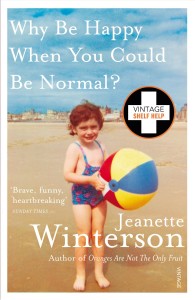 I first discovered Jeanette Winterson’s writing sophomore year at Brown, when Rosabelle (from the book) lent me her copy of Written on The Body. It had been assigned in one of her fiction classes and she kept raving about it. I loved the book so much and had never read anything like it before. Beautiful imagery, white-hot moments, riveting.
I first discovered Jeanette Winterson’s writing sophomore year at Brown, when Rosabelle (from the book) lent me her copy of Written on The Body. It had been assigned in one of her fiction classes and she kept raving about it. I loved the book so much and had never read anything like it before. Beautiful imagery, white-hot moments, riveting.
This week, I went to see Jeanette Winterson (most recently the author of the memoir Why Be Happy When You Can Be Normal) and Stephen Grosz, a psychiatrist who has compiled 15,000 hours of counseling time into 31 true cases revealing the mysteries of the human minds in The Examined Life) sit down together. It’s part of the Shelf Help Sessions, author events aimed at focusing on the literary antidote to life, rather than self-help books.
Here are some of the best Jeanette Winterson quotes from that night, although she was a very fast-talking, articulate Mancunian, so I could barely keep up. She’s also very funny, which is not what you would expect from her books. She said a lot of other great things that don’t make the list (go read her books. They’re unlike anything else out there). Anyway, here is her wisdom:
1. On the memoir she wrote about her childhood and her fraught relationship with her mother I didn’t intend to write it but the intolerable pressure forces itself out of you. I found that I was becoming forgetful, misplacing things which wasn’t like me. I started writing it as a way to keep track of things. The book was written with several parts simultaneously worked on and suddenly I had 15,000 words in a few weeks.
2. A.M. Homes, the author and friend told me, “You’re being disturbed at a cellular level. You don’t even know what it is yet.” (Here’s a great link to these two writers talking about writing and literature).
3. I couldn’t even talk about it but I could write about it. I couldn’t actually think about it but as soon as I sat down to the keyboard, I could write and write. But as soon as I got up, I’d stop thinking about it.
4. Memoir is trying to understand something in yourself and it continues to be explored; it’s a continuing narrative. It does not have to be a set of dismal facts. Nitpicking facts is not helpful in the journey of the soul.
5. On growing up: I realized I could change the story because I am the story.
6. The material reality I could be was transformative. I had to tell my own story to escape the world that was her story.
7. Children are encouraged to read about children that are just like them, but it should be the opposite. We need to read about someone that isn’t like us at all and form ourselves out of reading about these other experiences.
8. Tell the story with the most impact in a way the reader can recognize themselves in it even if their stories are as different as can be.
9. I’m not going to tell you my favorite book because we should be reading as much as we can. Just go into a bookstore and play on the shelves – that’s what I do. I go up and down floors picking up books.
10. There are three endings: revenge, tragedy and forgiveness. But endings are interesting because there really are no endings.

